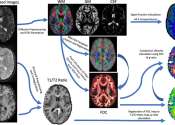A new study shows how neurochemicals affect fMRI readings
The brain is an incredibly complex and active organ that uses electricity and chemicals to transmit and receive signals between its sub-regions.
Mar 18, 2024
0
39
The brain is an incredibly complex and active organ that uses electricity and chemicals to transmit and receive signals between its sub-regions.
Mar 18, 2024
0
39

In the medicine of the future, tiny robots will navigate independently through tissue and medical instruments will indicate their position inside the body during surgery. Both require doctors to be able to localize and control ...
Apr 2, 2024
0
2

A new study by researchers at UC Davis Health found human brains are getting larger. Study participants born in the 1970s had 6.6% larger brain volumes and almost 15% larger brain surface area than those born in the 1930s.
Mar 26, 2024
0
42

A team of researchers led by Kim Hong Ji and Woo Choong-Wan at the Center for Neuroscience Imaging Research (CNIR) within the Institute for Basic Science (IBS), in collaboration with Emily FINN at Dartmouth College, has unlocked ...
Apr 11, 2024
0
30

Stressful experiences in midlife or during childhood may be associated with a higher risk of developing Alzheimer's disease and neuroinflammation, respectively. This is one of the conclusions of a study published in Annals ...
Apr 2, 2024
0
0

A study aiming to synthesize a three-dimensional (3D) printing resin with good mechanical properties, low cytotoxicity, antibacterial activities, and long-term fluoride-releasing properties was presented at the 102nd General ...
Mar 19, 2024
0
1

Magnetic resonance-guided focused ultrasound (MRgFUS) is a non-invasive technique for neuroregulation. It offers several advantages, including being non-invasive, eliminating the need for general anesthesia requirements, ...
Apr 3, 2024
0
0

Imagine that you are considering buying stock in a company. You know what its current value is, and you suspect that you could make a healthy return on your investment. But this stock is very volatile: some days up, some ...
Mar 21, 2024
0
8

Autism spectrum disorder has yet to be linked to a single cause, due to the wide range of its symptoms and severity. However, a study by University of Virginia researchers suggests a promising new approach to finding answers, ...
Apr 17, 2024
0
12

Many psychiatric illnesses are related to stress. Negative experiences in childhood can often affect how we deal with stress later in life. But what biological processes are involved? A study recently published in the journal ...
Apr 9, 2024
0
3

In physics, magnetism is one of the forces in which materials and moving charged particles exert attractive, repulsive force or moments on other materials or charged particles. Some well-known materials that exhibit easily detectable magnetic properties (called magnets) are nickel, iron, cobalt, gadolinium and their alloys; however, all materials are influenced to greater or lesser degree by the presence of a magnetic field. Substances that are negligibly affected by magnetic fields are known as non-magnetic substances. They include copper, aluminium, water, and gases.
Magnetism also has other definitions and descriptions in physics, particularly as one of the two components of electromagnetic waves such as light.
This text uses material from Wikipedia, licensed under CC BY-SA